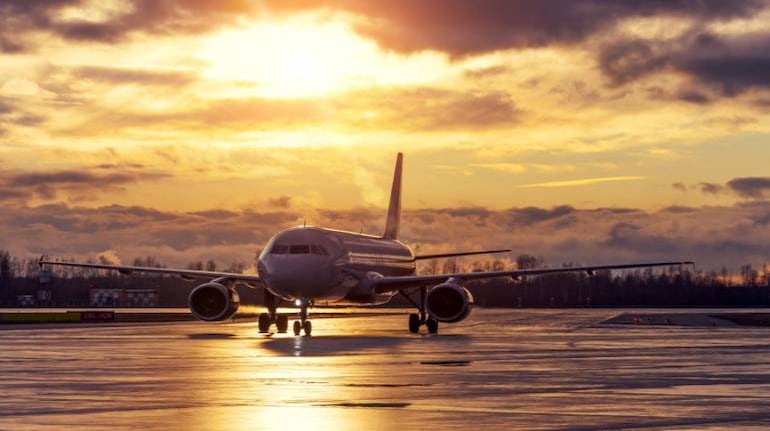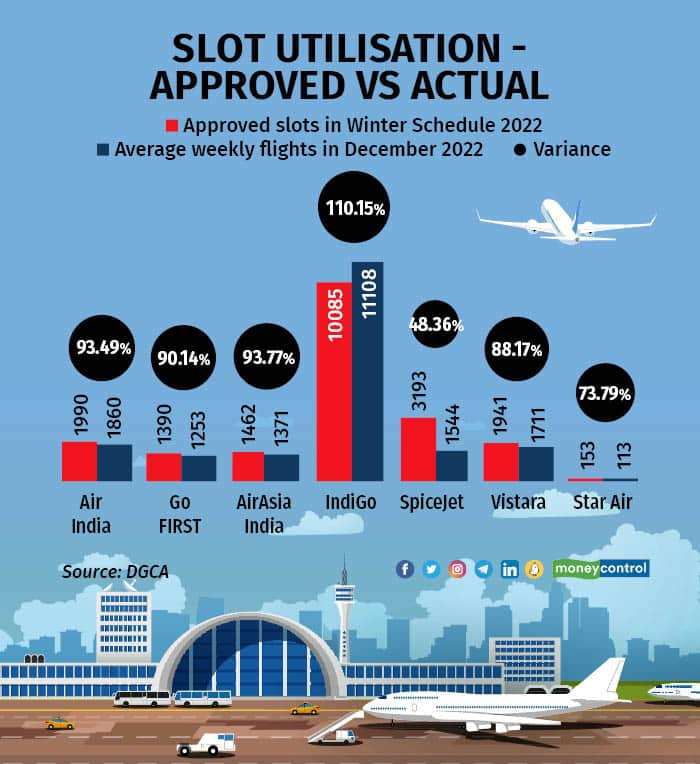



The Indian aviation scene is changing faster than one would have imagined, especially after COVID-19.
A well-capitalised airline, privatisation, mergers, a lot has either happened or about to happen very soon. As traffic returns to pre-COVID levels and global supply-chain issues ease out to help airlines induct aircraft faster than before, the focus shifts back on capacity augmentation at airports and holding slots.
The issue is dear to both types of airlines - the ones expanding and the ones shrinking.
How do airlines get slots?
Slots are held by airports and are a combination of availability of runways, aprons and terminal facilities. Slots are allocated to airlines, primarily twice a year – in summer and winter schedules. The slot allocation is based on historicity, and slots available after that are expected to be given out on the basis of the World Slot Guidelines, as defined by IATA.
This involves various stages of priority -- based on connectivity, new carrier, frequency and so on.
How does it matter to expanding carriers? When slots are given to airlines and not used, they are still blocked and hampers allocation to other carriers which may be willing to operate flights to either those destinations or at those times.
Shrinking carriers, more often than not, are looking to raise funds and a slot bank is an asset they would want to cash upon. Besides, a slot lost is near impossible to get back and the next opportunity would be presented only when another airline shrinks or goes down. For example, it took years for SpiceJet to climb up to the levels where it was pre-2014.
How are airlines doing this winter?
December 2022 was the best month for aviation in India, after COVID. After four scheduling seasons, Summer 2022 was the first season in which the passenger traffic pattern was in line with pre-COVID times. This shifted into winter very effectively, with every month seeing more traffic than the previous one.
With December the peak, it is also the best month to compare slot utilisation. For, if you haven’t utilised your slots in the best month, it is unlikely you would do it in months not as good as the best.
A look at the numbers mapped against the approved schedule shows it is market leader IndiGo which has done an impressive performance. IndiGo, even with the grounding challenges, exceeded its approved schedule -- having asked for more slots during the schedule.
The airline operated an average of 11,108 weekly flights in December, against an approved winter schedule of 10,085, which is 10 percent more than the approved schedule.
No other airline fully utilised their approved slots, leave aside exceeding them.

The next best performance came from AirAsia India, now a fully Tata-owned airline, and Air India, the flagship of Tata group. They operated 93.77 percent and 93.49 percent of approved schedules, respectively.
Go FIRST, ridden with engine issues, has been the most honest and prudent airline. It reduced its operations drastically at the beginning of the winter schedule. The airline has had a tough winter schedule, with anywhere between one-third and half of its aircraft being grounded. Yet, it utilised 90 percent of its approved slots.
Vistara, the Tata-SIA joint venture, which now occupies the second spot in the Indian market, saw 1,711 weekly flights against 1,941 approved in the winter schedule, which stands at 88 percent utilisation.
The worrying airline of the pack has been SpiceJet, which could not utilise even half its approved schedule. This, despite the fact that the airline had wet-leased planes in December. Essentially, the airline has been sitting on 1,500 weekly slots or over 200 daily departures. Potentially, these could be used by others -- be it IndiGo or newcomer Akasa Air, to expand.
Airports proactively take some slots away and allocate it to others, but struggle to take away all of them. Slot usage, too, goes up over a period of time since the airline plans for slots based on its induction plan, all of which is not at the start of the season.
Ministry actively involved
The Ministry of Civil Aviation has not been silent on this topic. Last November, it released a change for discussion. A final amendment is awaited, but the ministry wants to change the slot allocation guidelines to ensure that the ‘Use It or Lose It’ policy for slots is better implemented and measured sequentially instead of previous equivalent season.
While this would mean a departure from IATA’s World Slot guidelines, it would mean better utilisation of a resource, which is always scarce.
Over to the final guidelines, and, more importantly, implementation. In India, the best of laws can be put on the backburner for not being implemented and hopefully this won’t be one of them.
Discover the latest Business News, Sensex, and Nifty updates. Obtain Personal Finance insights, tax queries, and expert opinions on Moneycontrol or download the Moneycontrol App to stay updated!
Find the best of Al News in one place, specially curated for you every weekend.
Stay on top of the latest tech trends and biggest startup news.